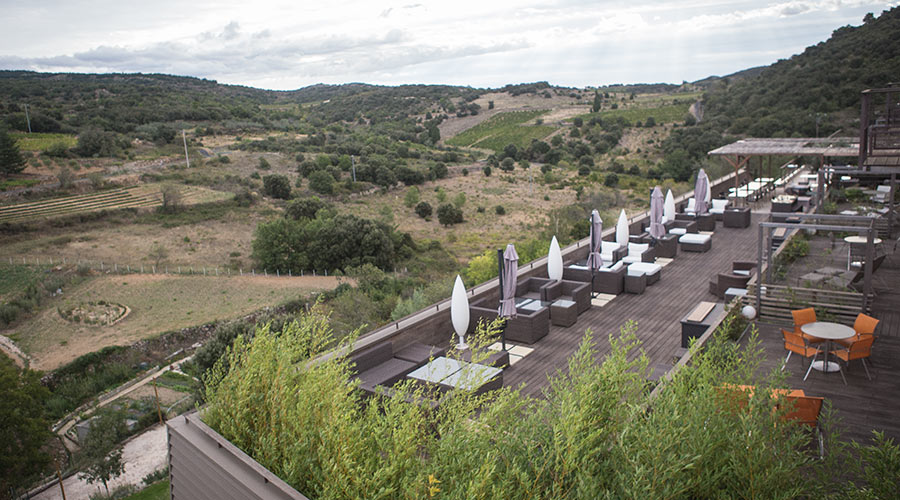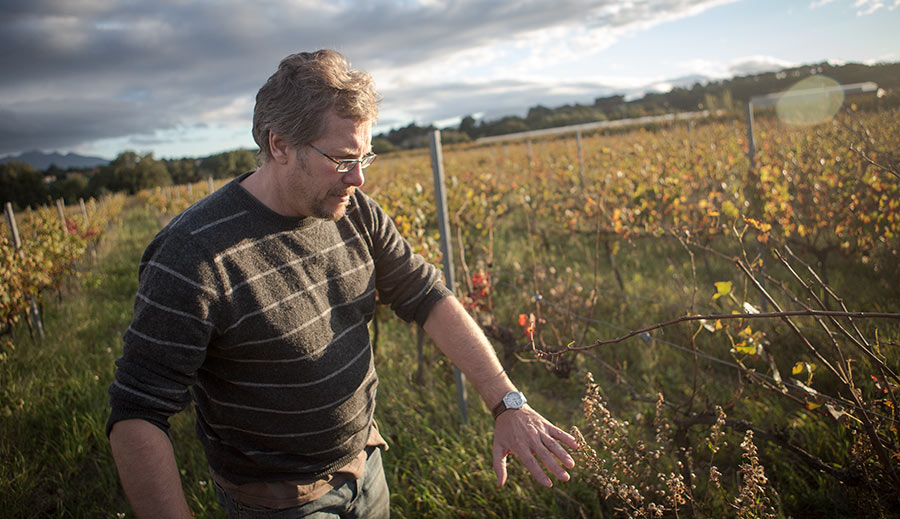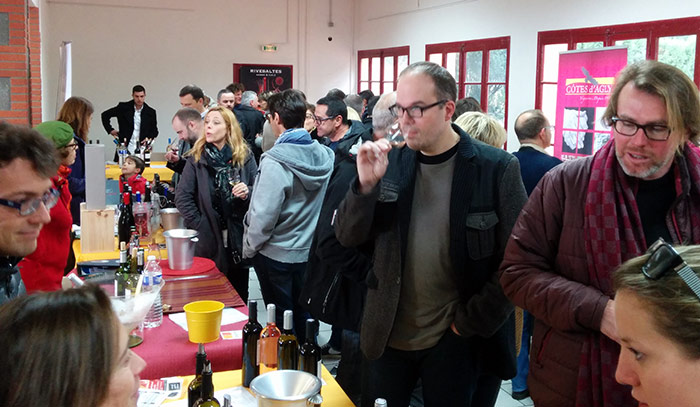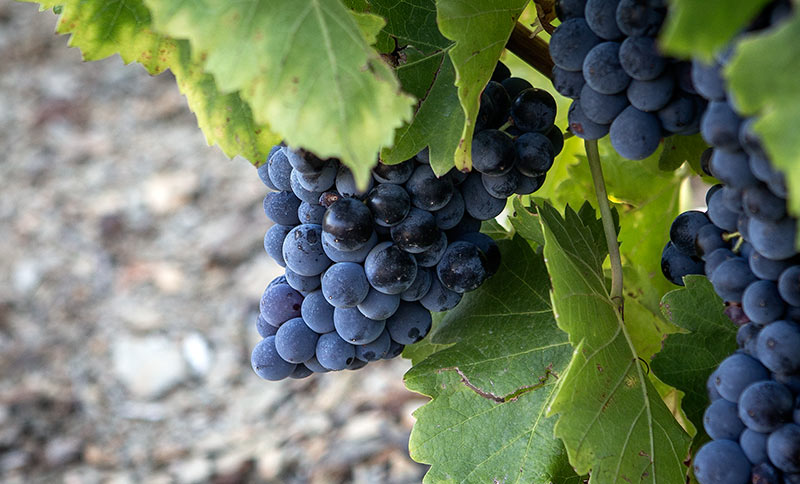To know the land of Roussillon is not to drive briefly through it, deftly avoiding Perpignan via the A9 highway either heading to adventures more northern in France or more southern in Spain. The real Roussillon lies inland, winding in to the various valleys that stretch back from the sea such as where Vingrau, Maury, & Bélesta call home. This village of Bélesta sits just past the striking Les Orgues d’Ille-sur-Têt and is perched up among some of the higher elevation parts of the region. When you first see it, you know you’ve arrived. Lovely in that way which has a glimmer of Catalan heritage while at the same time drifting deeper in to the Midi. It’s here that you find, Domaine Riberach.
 This old winemaking cooperative sits dominantly in the village and was built in two stages in 1925 and 1931. Recent years haven’t been kind to this region and it closed in 1995, quickly falling into disrepair. Architect, Luc Richard watched this as he came back for holidays due to his family originally being from the village. In 2007, with the help of his wife, Karin Pühringer, who is a very successful hotelier in Austria, they set about to restore the building and give it a new lease on life both as a winery and a boutique hotel/restaurant with a wine theme. This is a similar theme as the Cramim Hotel I stayed at during a wine press trip in Israel.
This old winemaking cooperative sits dominantly in the village and was built in two stages in 1925 and 1931. Recent years haven’t been kind to this region and it closed in 1995, quickly falling into disrepair. Architect, Luc Richard watched this as he came back for holidays due to his family originally being from the village. In 2007, with the help of his wife, Karin Pühringer, who is a very successful hotelier in Austria, they set about to restore the building and give it a new lease on life both as a winery and a boutique hotel/restaurant with a wine theme. This is a similar theme as the Cramim Hotel I stayed at during a wine press trip in Israel.
The heat of August was just starting to fade as I was invited to tour the hotel early last fall. The quick onset of a nasty cold was set to detract from the experience, but I went anyways as the chance to tour areas in Roussillon is one that I readily seize upon. Myself and a couple of other journalists from Catalonia spent the night at the hotel and were hosted by Luc and his affable, attentive, and knowledgeable staff. We were also joined by some local French journalists and with little shared languages between us, made for some admittedly difficult times communicating.
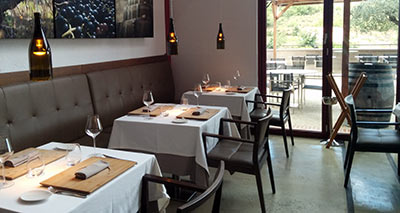 The restaurant, headed by chef Laurent Lemal has been awarded one Michelin star and indeed, in terms of service, presentation, and overall food quality, I found it to be a solid restaurant. Whether it deserves that star or not is up for debate as friends in France tell me, “Oh sure, clean your floor, serve local dishes with a touch of modernity on big plates, and set Riedel glasses on the table. That’ll get you a star in France.” I would tend to agree. Of course it was actually a bit difficult to fully judge the restaurant given we had one meal there where it seems we received a randomly distilled version of their tasting menu along with a somewhat random selection of their wines.
The restaurant, headed by chef Laurent Lemal has been awarded one Michelin star and indeed, in terms of service, presentation, and overall food quality, I found it to be a solid restaurant. Whether it deserves that star or not is up for debate as friends in France tell me, “Oh sure, clean your floor, serve local dishes with a touch of modernity on big plates, and set Riedel glasses on the table. That’ll get you a star in France.” I would tend to agree. Of course it was actually a bit difficult to fully judge the restaurant given we had one meal there where it seems we received a randomly distilled version of their tasting menu along with a somewhat random selection of their wines.
Laurent has been working to create a restaurant that is a destination unto itself. This is a worthy cause to pursue as regardless of my own personal takeaway and Michelin opinions, there are extremely few restaurants of this caliber in the immediate region. Several winemakers in Roussillon that I know often make the trip to Bélesta just to eat at Riberach.
As I was feeling much less than great the next morning I didn’t go out to the vineyard at the crack of dawn (Luc initially wanted us out and about at 05:30) to experience the harvest. Harvests I know well from working several vintages in Spain so I passed and they were to come get me when heading down to the cellar. My editor-in-chief went and reported back that the old-vine Carignan Gris vineyards were actually quite striking and they have many at high elevations which make their way in to their top wines.
I laid around my room and as the hours went on, it registered that I had been forgotten. I also realized that the restaurant had closed their breakfast hour so I pleaded to have a bite in my room. I enjoyed that a great deal and it motivated me to get out of bed and join everyone at a snail lunch in one of their vineyards. While this kind of activity is all the rage for urban French, it’s a bit odd to take a group from Catalonia–where people eat magnitudes more snails than the French–and do a cargolada. It was a nice setting as we sat under the yawning expanse of an ancient plane tree. The breeze of the Mediterranean wafting up through this tucked away valley and tossing about the branches of the Carignan and Grenache Gris bush vines.
We drank two of the lower-end Riberach wines during lunch but tasted a few more of their 12 wines upon returning to the hotel although they seemed something of a repeat from the dinner the previous night although I could have just been confused by the similar-sounding names. It was a bit unstructured overall as it mixed a group of general press with the one or two of us specialized in wine. As such, I had great trouble trying to get a good feel for the wines they make. The whites we tasted were all indicative of the region being crisp, refreshing and excellent blends of Macabeu (which they pronounce maca-BUH in French) and Carignan/Grenache Gris. The reds didn’t stack up as well as it seems we were tasting the lower-end wines, again I suppose due to the oddly mixed group. I’m still a bit bothered that we didn’t try the Hypothèse red as it’s from old-vine Carignan which I’m completely enamored of. The younger wines were generally stalky and tight, firmly in the direction of the style I don’t like in Roussillon as opposed to what other cellars like Treloar are doing.
 We ended up closing with a full tour of the hotel which is the most interesting aspect of the project for they took the old, 50,000 liter tanks and converted them in to hotel rooms with the main production floors becoming the restaurant. There are five rooms in the tanks and then 11 above the tanks. It would seem that there should be the same amount of both as one sits directly above the other but in one section of tanks, they carved out a spa. It’s a curious space as while the tanks are large, there is a definite limit in size to them so they’ve worked to make use of all the nooks. It has a feel a bit similar to what you see in the movie “Snowpiercer” where the remnants of humanity are all living on a gigantic train, circling the globe except in this case, you can enjoy a sauna and massage in this curious tank space before going for a stroll in the Southern French countryside.
We ended up closing with a full tour of the hotel which is the most interesting aspect of the project for they took the old, 50,000 liter tanks and converted them in to hotel rooms with the main production floors becoming the restaurant. There are five rooms in the tanks and then 11 above the tanks. It would seem that there should be the same amount of both as one sits directly above the other but in one section of tanks, they carved out a spa. It’s a curious space as while the tanks are large, there is a definite limit in size to them so they’ve worked to make use of all the nooks. It has a feel a bit similar to what you see in the movie “Snowpiercer” where the remnants of humanity are all living on a gigantic train, circling the globe except in this case, you can enjoy a sauna and massage in this curious tank space before going for a stroll in the Southern French countryside.
Riberach is definitely not a budget option although it is overall slickly done, a very cool concept, and in a very pretty part of the region which can be taken in quite nicely from their freshwater pool. In wanting to be as low impact as possible on this region, they have built the hotel to be extremely low in power use, have a great many solar panels, grow their own organic food in the onsite garden, and a slew of other details that Luc as architect on the project, embedded in to the design.
And this is where the project soars in that these attention to details in terms of the hotel and restaurant are excellent. It both pays tribute to the old structure while at the same time, nudging it along in to the 20th century. Naturally it doesn’t hurt that Luc built a slick modern office for himself to work at one end of it. The big question is to whether Riberach is a destination unto itself. In terms of hotel and restaurant, despite my quibbles there is little else to be found at this level in the region but in terms of the wines, I feel like that is the part that still needs work. Of course I’m always open to trying the wines again at some point and having my opinion changed.
I would most definitely love to see Riberach succeed as there are other regions (such as Priorat where I live) that are in great need of copying this many times over.
